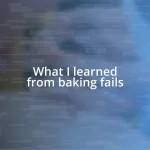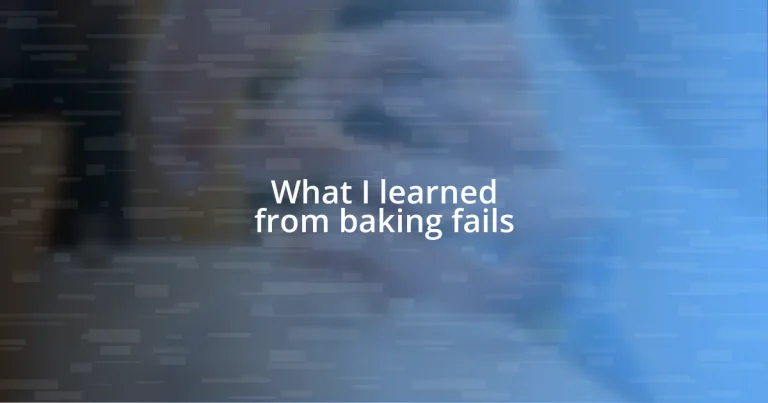Key takeaways:
- Baking failures are learning opportunities that can enhance skills and deepen connection to the process.
- Common baking issues include flat cookies, sunken cakes, and dry muffins, often caused by factors like improper measurements and inadequate technique.
- Embracing imperfections and transforming failures can lead to creative innovations and unexpected delights in baking.

Understanding baking fails
Baking fails are more common than most people think, and understanding their causes can be quite enlightening. I remember one time when my cupcakes sank in the middle; it felt like a mini disaster. Was it the oven temperature? Or could it have been the old baking powder I used? It was a moment of disappointment, but it also taught me to be more mindful about checking ingredients.
It’s easy to get frustrated when things don’t turn out as planned, but I’ve realized that each failure comes with a lesson. For instance, when my bread turned out dense and chewy rather than fluffy, it pushed me to research proper kneading techniques. The emotional rollercoaster of these experiences sparked a deeper connection to the process, turning baking fails into opportunities for growth.
Every time something goes awry in the oven, I ask myself: “How can I use this to become a better baker?” That mindset shift has transformed my attitude towards mistakes in the kitchen. I’ve learned to embrace the messiness of baking, knowing that the best discoveries often lie in the moments that seemed like failures at first.
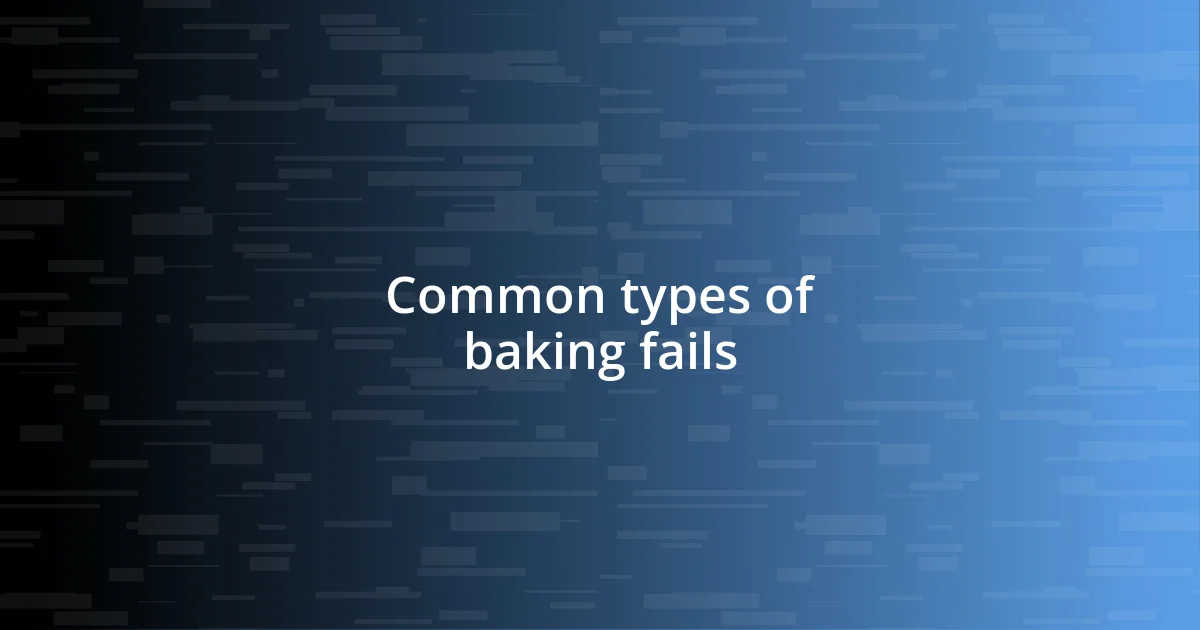
Common types of baking fails
Baking fails can manifest in various forms, each with its own distinct characteristics. One common issue is the dreaded flat cookie, which often results from overmixing the dough or forgetting to chill it before baking. I recall a batch of chocolate chip cookies that spread so much they became one giant cookie on the baking sheet. The joy I anticipated quickly turned into a lesson about not skimping on the chilling time, which ultimately led to cookies with the perfect texture.
Another frequent baking mishap is the sunken cake, a heart-wrenching sight for any baker. More often than not, this occurs due to a sudden temperature change or underbaking. I once made a beautiful lemon cake for a friend’s birthday. When I pulled it out of the oven, it resembled a cratered moon surface rather than a fluffy dessert. That moment was frustrating but led me to explore oven calibration and the importance of proper timing, which vastly improved my baking skills.
Lastly, dry muffins seem to be a common complaint among home bakers and can happen if you overbake them or misjudge the liquid ratio. I vividly remember biting into what I hoped would be a delightful blueberry muffin, only to encounter a crumbly disappointment. That experience taught me the importance of trusting my instincts and testing with a toothpick to avoid unnecessary baking time. These baking fails, while disappointing at the moment, can provide valuable insights, turning baking from a mere task into an enriching journey.
| Type of Baking Fail | Common Causes |
|---|---|
| Flat Cookies | Overmixing or skipping chilling time |
| Sunken Cakes | Sudden temperature changes or underbaking |
| Dry Muffins | Overbaking or incorrect liquid ratio |
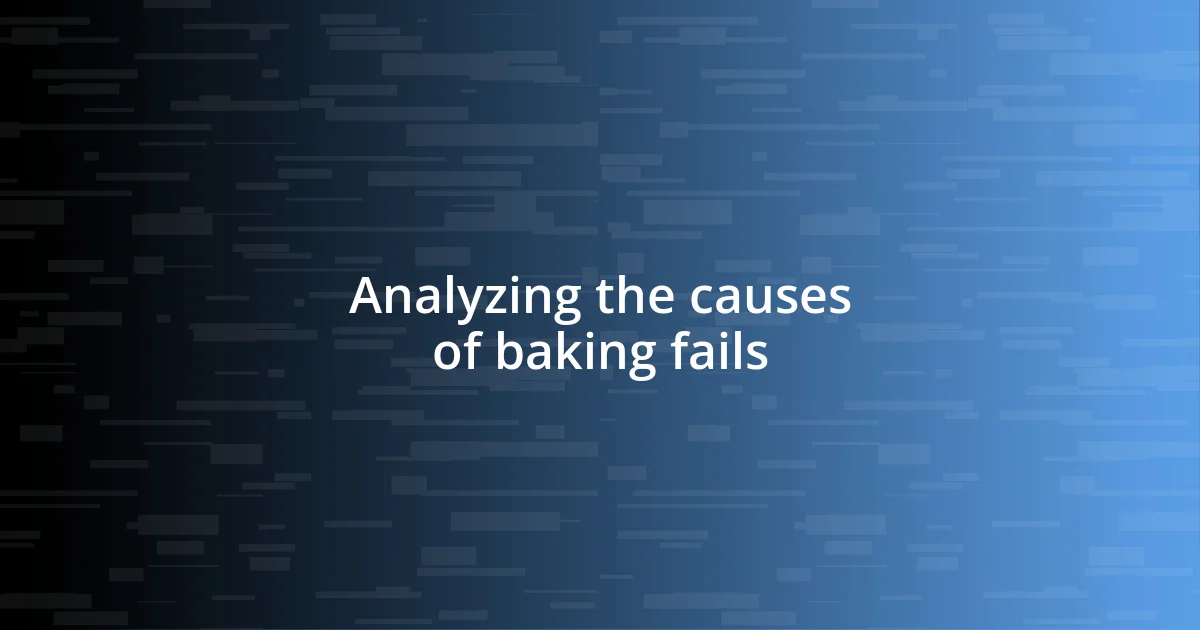
Analyzing the causes of baking fails
Analyzing the causes of baking fails often takes me back to my own kitchen mishaps. I recall a sour moment when my sponge cake ended up rubbery and dense. I later discovered that I had rushed the folding process, deflating the air I had just whipped into the egg whites. It was a stark reminder of how small techniques can drastically affect the final product.
To help pinpoint the roots of these baking blunders, here are some common causes I’ve identified:
- Incorrect measurements: A missing tablespoon of flour can make all the difference.
- Inaccurate oven temperature: My old oven had a mind of its own; it never hurt to invest in an oven thermometer.
- Using expired ingredients: I’ve learned to check the dates on my baking powder to avoid unnecessary heartbreak.
- Rushing the process: Baking requires patience, and I’ve seen first-hand how impatience can ruin a good recipe.
Reflecting on these missteps not only highlights the technical aspects of baking but also emphasizes the importance of attentiveness and care in the kitchen.

Learning from my baking experiences
Learning from my baking experiences has been a journey filled with both laughter and lessons. I remember one time when my bread came out more like a brick than a loaf. I was initially heartbroken, but then I realized that I hadn’t let the dough rise long enough. Since then, I’ve taken to timing my rises meticulously. It’s amazing how simply allowing the dough to breathe can transform the texture and flavor. Have you ever experienced that moment of realization when you discover the power of patience in baking?
Another incident that stands out is when I attempted to make a pie from scratch. The crust was tough and unyielding, a far cry from the flaky goodness I envisioned. It didn’t hit me until later that I had overworked the dough. Now, whenever I make pie crust, I remind myself that a gentle touch is key. If you’ve faced a frustrating dough situation, you know it can feel like a personal failure, but it’s also a growth opportunity. Embracing these moments leads to a stronger baking foundation.
I also learned vital lessons about the role of temperature control. One day, I decided to bake a cheesecake but forgot to let the ingredients come to room temperature. The result? A lumpy texture that was less than appetizing. This taught me the importance of planning ahead. Now, I do little checks to ensure my ingredients are prepped before I start. Isn’t it funny how something as simple as a few degrees can make or break a recipe? Each baking experience, especially the fails, layers into my growing knowledge, making me a more confident home baker.
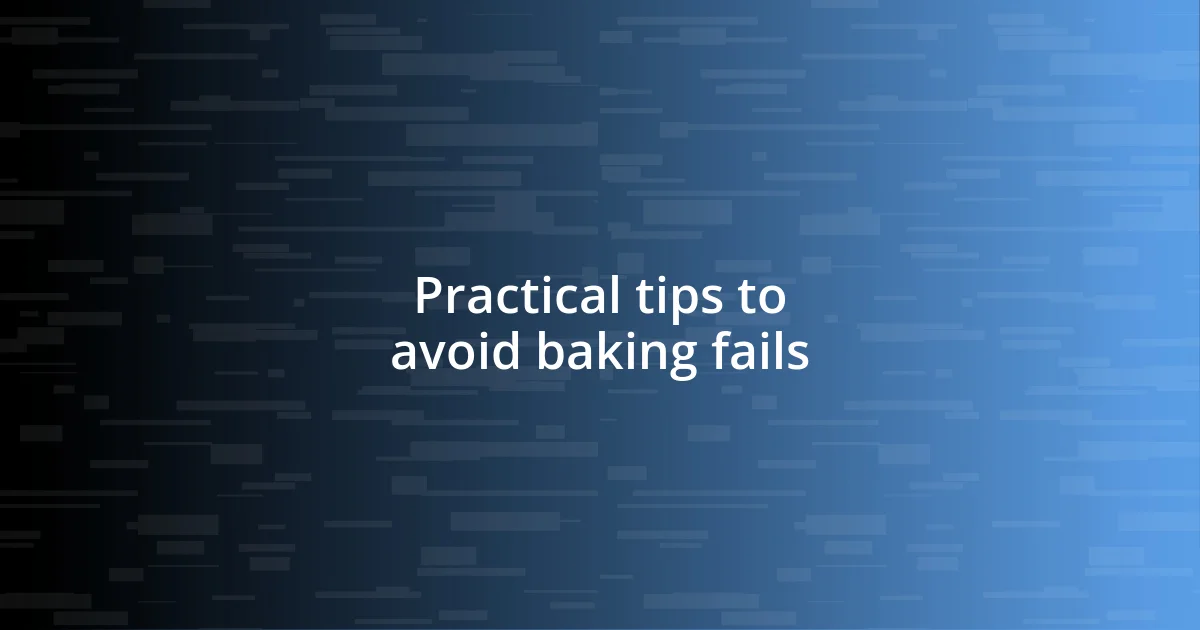
Practical tips to avoid baking fails
When I think about practical tips to avoid baking fails, one crucial element pops into my mind: patience. I remember one particularly chaotic morning when I tried to multitask while baking cookies. I peeked at the dough, and in my haste, I skipped the chilling step. The result? Flat, speckled pancakes instead of the chewy cookies I envisioned. Now, I always remind myself that a little bit of waiting can yield delightful rewards.
Another tip I swear by is to embrace the power of mise en place, which is a fancy way of saying “everything in its place.” I had a mishap where I was knee-deep in mixing when I realized I hadn’t sifted the flour beforehand. The clumps created a lumpy batter that completely ruined my cake. Since that day, I make it a point to gather and prep all my ingredients before I dive into mixing. It’s remarkable how this simple step can nip potential disasters in the bud. Who wouldn’t want to avoid that last-minute rush?
Finally, let’s talk about the importance of reliable recipe sources. I once attempted a blogger’s pie recipe that sounded great but quickly became a disaster. The instructions were vague, and my poor crust turned out soggy. I learned the hard way that not all recipes are created equal. Now, I stick to tried-and-true sources when I’m baking for an occasion. Have you ever cooked from a recipe that just didn’t deliver? Trust me, knowing who to turn to for a foolproof guide makes all the difference in your baking success!
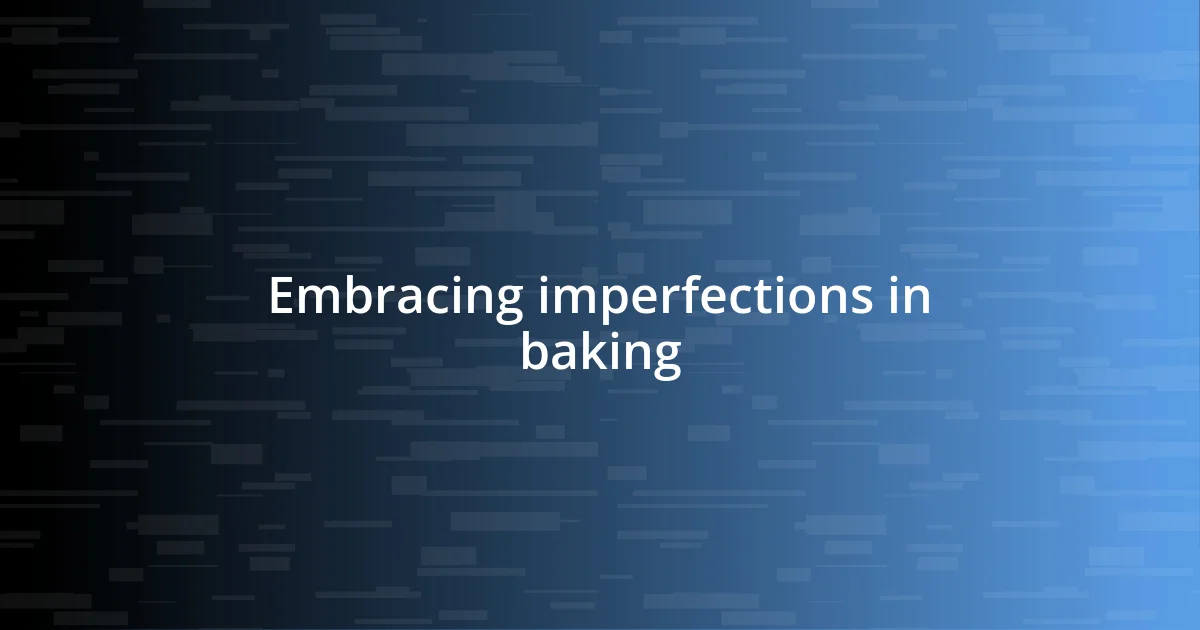
Embracing imperfections in baking
Embracing imperfections is not just about accepting what went wrong but celebrating the growth that comes from it. I recall a time when I attempted a fancy soufflé, only to have it collapse spectacularly moments after pulling it from the oven. Initially, it felt like a culinary disaster, but upon reflection, I realized that the experience taught me about the delicate balance of air and temperature. Isn’t it liberating to think that even the most skilled bakers face a flop here and there?
There’s something profoundly freeing about acknowledging that not every batch will turn out perfect, and that’s okay. One Christmas, I decorated a batch of cookies that ended up looking more like abstract art than the snowmen I intended. Instead of being disheartened, I decided to name them “modern interpretations of winter cheer.” The laughter that followed created an atmosphere of joy rather than disappointment. Have you ever found humor in your baking blunders? It’s these lighthearted moments that encourage creativity and spontaneity in the kitchen.
Learning to see the beauty in imperfection has had a lasting impact on my baking journey. I remember a time when a cake I baked failed to rise properly. Instead of tossing it, I turned it into a trifle by layering the crumbled cake with cream and berries. That unplanned dessert surprised everyone at the dinner table, proving that sometimes, mistakes can lead to delightful discoveries. How many flavors have you explored because of a misstep? Embracing imperfections allows us to innovate, revealing the true art in the process of baking.

Transforming failures into successes
There’s something profoundly transformative about examining a baking failure and turning it into a success. I vividly recall a time when I attempted a beautiful layer cake for a friend’s birthday celebration. When I sliced into it, the layers seemed to glue together like they were best buds. It was frustrating, and I was ready to throw in the towel. But then it hit me: why not make cake pops instead? With some creative flair, I crumbled the cake, mixed it with frosting, and rolled them into delightful bites. Instead of a disappointing dessert, I ended up with a fun and festive treat that everyone loved. Isn’t it amazing how a little creativity can turn potential embarrassment into a sweet surprise?
Transforming my baking failures into successes has taught me about resilience. One rainy afternoon, I was all set to bake a batch of cinnamon rolls, but the dough refused to rise. I almost gave up, but instead, I decided to experiment. I added some chocolate chips to the dough and baked what turned out to be a heavenly twist on the classic. It was a delightful detour that created a new family favorite. Have you ever salvaged a baking project and ended up enjoying the unexpected results even more? It’s often in those moments of uncertainty that we discover new paths.
Every failure offers a unique opportunity for re-evaluation. I remember wrestling with an overly sticky dough that seemed determined to defy all attempts at rolling. Instead of fighting it, I chose to pivot. I rethought my approach, grabbed a muffin tin, and turned those rebellious ingredients into delightful muffin bites. The joy of that unexpected result reminded me that sometimes stepping back and taking a different angle is all it takes to find success. How often do we overlook the potential in our mishaps? It’s a little nudge to remind us that every misstep can lead to delightful innovations in the kitchen.


